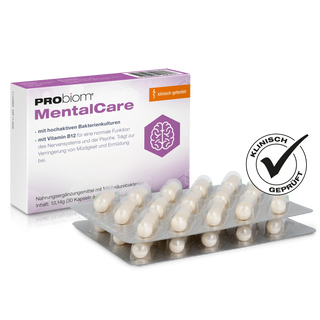Dry mouth – medically known as xerostomia – is a common, often underestimated problem for many people. What at first glance appears to be a purely physical symptom often also has a psychological component. The interactions between the psyche, nervous system, and saliva production are close and complex. In this article, we explore the connections between dry mouth and mental well-being, explain the role of oral flora, and take a special look at the potentially helpful probiotic Streptococcus salivarius M18 .
What is xerostomia?
Xerostomia refers to the subjective sensation of a dry mouth, which may be accompanied by or without an objectively measurable reduction in saliva flow (hyposalivation). Typical symptoms include:
-
Dry mouth, especially at night or in the morning
-
Difficulty swallowing and speaking
-
Burning sensation on the tongue or mucous membrane
-
Taste disorders
-
Increased caries or gum inflammation
The causes are diverse – from side effects of medications (e.g. antidepressants, antihypertensives, antihistamines) to systemic diseases (e.g. Sjögren's syndrome, diabetes mellitus) to psychological stress.
The psyche as an influencing factor in dry mouth
Salivation is predominantly regulated by the autonomic nervous system. The parasympathetic nervous system promotes saliva secretion, while stress reactions associated with activation of the sympathetic nervous system can inhibit saliva production.
Psychological stress such as anxiety, tension, or depression are therefore common triggers or exacerbations of dry mouth. Especially during periods of high emotional stress, many people report a "dry" feeling in their mouth – a phenomenon that can be explained from an evolutionary perspective by the fight-or-flight response.
Furthermore, it has been shown that patients with chronic anxiety disorders or somatoform disorders exhibit increased sensitivity to physical sensations . This means that even normal or slightly reduced amounts of saliva can be subjectively perceived as very disturbing.
Consequences of xerostomia for mental well-being
Dry mouth rarely goes unnoticed. The symptoms not only affect physical well-being but can also have social and psychological consequences:
-
Reduced self-esteem due to bad breath or speech problems
-
Avoiding conversations or social contacts
-
Sleep disturbances due to dry mouth at night
-
Increased fears, especially of illness (e.g. fear of cancer)
-
Chronic dissatisfaction or depressive symptoms
This can lead to a vicious circle : psychological stress causes xerostomia, which in turn increases psychological suffering – a classic psychosomatic interplay.
The role of the oral microbiota – a look into the oral cavity
Little-noticed, but central to understanding dry mouth, is the oral microbiota —the entirety of microorganisms that colonize our mucous membranes. A balanced microbial balance is crucial for:
-
the stability of the oral mucosa
-
the inhibition of pathogenic germs
-
the saliva composition
-
the immune response in the oral area
With dry mouth, this balance is often disrupted. The reduced saliva flow weakens the natural defense mechanisms, allowing opportunistic bacteria (e.g., Streptococcus mutans, Candida spp.) to gain the upper hand. This promotes inflammation, tooth decay, and bad breath—further exacerbating the discomfort.
Streptococcus salivarius M18 – a potential helper from the microbiota
A particularly interesting microorganism is the probiotic strain Streptococcus salivarius M18 , which occurs naturally in healthy oral flora. Unlike pathogenic streptococcal species, M18 exhibits health-promoting properties that are receiving increasing attention in studies.
Potential mechanisms of action of S. salivarius M18:
-
Inhibition of pathogenic germs : M18 produces bacteriocins that can suppress pathogenic bacteria such as Streptococcus mutans or Porphyromonas gingivalis .
-
Reduction of oral inflammation : By stabilizing the microflora, gingivitis and bleeding gums are reduced.
-
Promotes mucosal health : M18 can strengthen the barrier function of the oral mucosa.
-
Possible stimulation of saliva flow : Initial studies suggest that probiotic administration could have a beneficial effect on physiological saliva production – either directly or indirectly by relieving the oral immune system.
In the form of lozenges or oral probiotics, M18 is already being used for caries prevention, halitosis and dry mouth – with promising results.
A holistic therapy approach
The treatment of xerostomia should not only be symptom-oriented, but also cause-oriented and psychosomatically integrated . A holistic approach includes:
-
Clarification and reduction of possible medications that cause dry mouth
-
Psychotherapeutic interventions , especially for anxiety or stress symptoms
-
Regular oral care and use of saliva substitutes or stimulating lozenges
-
Probiotic therapy with S. salivarius M18 to support microbial balance
-
Behavioral and relaxation techniques to calm the autonomic nervous system (e.g., breathing exercises, mindfulness, biofeedback)
-
Fluid intake and nutrition that is hydrating and low-irritation
Conclusion
A dry mouth is more than just a minor everyday problem—it can be a manifestation of emotional stress, but it can also be a factor that exacerbates psychological suffering. The close connection between the psyche, nervous system, and oral health requires a holistic approach to diagnosis and treatment.
The targeted use of oral probiotics such as Streptococcus salivarius M18 opens up an innovative therapeutic approach that can both strengthen the oral flora and contribute to symptom relief. Combined with psychological support and proven stress management measures, the vicious cycle of xerostomia and psychological stress can be broken – for greater well-being in the mouth and in life.















